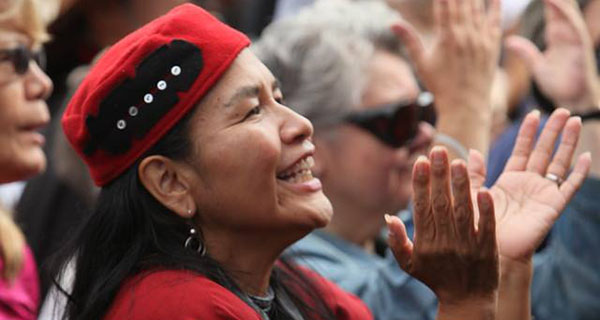 Rose Conway-Walsh identifies as a confidently progressive left-of-centre leader of Sinn Féin in the Irish Senate.
Rose Conway-Walsh identifies as a confidently progressive left-of-centre leader of Sinn Féin in the Irish Senate.
She’s equally confident, however, that many of Ireland’s pressing, implacable existential problems could be resolved by turning the clock back to April 24, 1916.
“Everything is rooted in the Proclamation. If we only had fulfilled the ideals laid out in the Proclamation, we would have things solved,” the veteran republican politician from County Mayo in the island’s northwest insists.
Conway-Walsh’s comments came during a brief visit to Montreal and Toronto to commemorate the Easter Rising of 1916. That’s when a handful of republican rebels took control of the General Post Office in Dublin, reading out the Proclamation declaring Ireland’s unilateral independence from the United Kingdom after 752 years as an oppressed colony.
Freedom didn’t last long – six days, in fact. The British army laid waste to Dublin’s centre, killed numerous civilians, rousted rebel forces scattered around the city and immediately executed 14 republican leaders.
Out the Easter Rising’s collapse came a century that included a war of independence, a civil war, the British government’s division of Ireland backed by threats of full-scale military invasion, anti-Catholic pogroms in the Protestant north and, ultimately, the murderous 30-year “Troubles” that brought fragile peace only in 1998 with the Good Friday Agreement.
Yet as Conway-Walsh points out, the ideals articulated more than a century ago in the Irish Republic’s 1916 Proclamation are now the bedrock of most Western nations, indeed of the functioning global order. In five short, sharp, eloquent paragraphs, it encapsulates the deep pluralism that all free people treasure even if they observe it in the breach more often than in practice.
Conway-Walsh calls back those ideals not only out of mist-shrouded antiquarian abstraction, but in the spirit of specific, active recovery of effective governing principles. She identifies them as essential to sound social architecture for Ireland, but equally for everywhere the Irish diaspora exists.
“Everybody must have a right to their identity whether they are British or Irish or both or neither. That is the type of island we are trying to create as republicans: that it’s okay to be British. It’s okay to be Irish. It’s okay to be both. It’s okay to be neither,” she says.
The words are a contemporary take on the 1916 Proclamation’s guarantee of “religious and civil liberty, equal rights and opportunities to all its citizens,” and its promise to “cherish the children of the nation equally, oblivious of the differences carefully fostered by an alien government, which have divided a minority from the majority in the past.”
For Conway-Walsh, those glowing statements must underlie the economic realities of Ireland by which the marginalized in both the Protestant, or unionist, and Catholic, or nationalist, working classes have been misled and left behind.
“That goes back to having strong institutions up and running. But it also means a process of building up trust for a new and agreed (upon) Ireland.”
It means dissipating the lingering fears in both communities that stretch back to failures in the aftermath of the civil war a century ago to forge reconciliation. It might also mean, she acknowledges, Ireland conducting its own version of the Truth and Reconciliation pioneered in Nelson Mandela’s South Africa and adapted in Canada to genuinely reset relations between Indigenous and later arrival Canadians.
At a very basic, practical level, it means major infrastructure improvements in rural counties so that politically engaged citizens of Northern Ireland direct their energies to demanding adequate roads, proper health care and 21st century broadband.
It means, above all, the political class listening rather than constantly proclaiming history’s quarrels.
“That’s why proper reconciliation is vital: so you don’t have people continuing to vote over the future decades on whether they’re Catholic, Protestant, unionists, republicans, whatever they might be. They’re voting for reasons that have nothing to do with sectarian reasons.”
What’s true for Ireland is equally true for anyone, anywhere, who cares about renewing sound social architecture. Listening to a 103-year-old Proclamation of equality, pluralism, and freedom might just be a wonderful place to start.
Peter Stockland is a senior writer with the think-tank Cardus and publisher of Convivium.ca. Read the full version of this article in Convivium.
The views, opinions and positions expressed by columnists and contributors are the author’s alone. They do not inherently or expressly reflect the views, opinions and/or positions of our publication.


